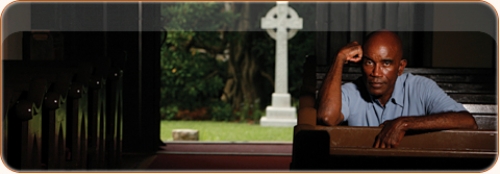His grandfather used to tell him hoodoo horror stories about the neighbors. “I saw it!” he’d say. “This woman put something on him and he fell down and died and black bugs ran out of his mouth.”
“It terrified me,” James Coleman says. “My grandfather could tell some scary stories.”
Even now, he’s found, there’s no way to avoid it. Coleman had barely gotten his feet wet in his research for Faithful Vision: Treatments of the Sacred, Spiritual, and Supernatural in Twentieth-Century African American Fiction when he realized that hoodoo mythology and its influence were in almost every book he read. Christianity was formative for those writers, he says, but hoodoo—the African American manifestation of voodoo—is tightly enmeshed in their spiritual themes.
Coleman was raised in the Baptist faith in a small community in Virginia. “Everybody in my family was devoutly Christian,” he says. “But there was this other aspect of supernatural experience that was very real for them. My grandfather would separate that from his Christianity.” Hoodoo, which has a way of melding with local religions, became part of the community’s spirituality.
“I was afraid of hoodoo just like everyone else. The main fear that people of my grandfather’s generation talked about—and I never really witnessed this—was of someone burying something under your doorstep to conjure you. That was one way that you’d be hoodooed. It was all so shadowy and obscure, and at the same time so real. You know, all of that sounds so fantastic and unbelievable, but people swear by it.”
It was a different story when Coleman left home for a life in academia. Literary critics don’t put a lot of stock in what some call superstition, or even in mainstream religion, he says, and he eventually found himself alienated from the community in which he was raised. “I think that academia tends not to take religion seriously,” he says. “I grew up in a community where not only the black people, but the white people too, were really serious about religion. Even the drunks and reprobates. And people still are. As I moved further into academia, I went further and further away from that whole spiritual and religious focus.”
Now, he wonders, where does all of this fit in his research to come?
Christianity and the Bible are weighty influences for contemporary African American writers, Coleman says, and it shows in their work. Faithful Vision explores how some authors such as James Baldwin and Toni Morrison are extremely critical of the religious experience. But, Coleman says, “there’s a difference between critiquing something while still taking it seriously, and not being serious about it at all.”
Literary kin
The estranged black intellectual is not a new phenomenon, Coleman says. Novelist John Edgar Wideman, one of Coleman’s literary heroes, found himself isolated from the values of his community as he drifted further into academia after becoming one of the first black Rhodes Scholars. Wideman’s novels, Coleman says, reveal African American spirituality as a mainstay of black people.
“Wideman’s life is fraught with tragedy,” Coleman says. “That’s part of the attraction and fascination of his work.” Wideman’s literary career and turbulent family history—his brother and son are both in prison for murder—led to his disenchantment and uncertainty about his relationship to the black community, which is a theme in some of his novels. It was Wideman’s tumultuous family relationships that drew his interest and appreciation, Coleman says, “because I’ve always felt uncertain about my place in my own family.
“I grew up in a shroud of secrecy about who I was,” Coleman says. Raised an only child with a loving but secretly surrogate mother, he began to piece together his family history from things he heard friends and neighbors say. No one in his family explicitly told him about his biological mother and five siblings until only fifteen years ago. It was his own spirituality, he says, that helped him deal with that exposed secret.
Religion and spirituality have not only shaped the African American novels we read today, Coleman says, but are also sculpting the novels we’ll read in fifty years.
“In talking to my students, who have all kinds of contemporary influences, including hip-hop, I find that particularly African American students are if anything more religious right now than they’ve ever been.” And Coleman’s research is moving him toward an opportunity to explore his own religious roots, he says, possibly in the form of some autobiographical writing.
“Faith is what brought African Americans through slavery,” he says. “It doesn’t seem to me that the world is becoming any less challenging for anybody. The challenges are just different. Religion is just the fundamental way that many African Americans address that challenge.”
James Coleman is professor of African American literature at Carolina. His most recent book, Faithful Vision: Treatments of the Sacred, Spiritual, and Supernatural in Twentieth-Century African American Fiction, was published in 2006 by Louisiana State University Press. He’s currently writing a biography of James Edgar Wideman for Praeger Press.


